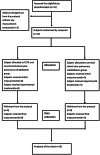The effect of craniocervical flexion and neck endurance exercises plus pulmonary rehabilitation on pulmonary function in spinal cord injury: a pilot single-blinded randomised controlled trial
- PMID: 38654004
- PMCID: PMC11039743
- DOI: 10.1038/s41394-024-00637-2
The effect of craniocervical flexion and neck endurance exercises plus pulmonary rehabilitation on pulmonary function in spinal cord injury: a pilot single-blinded randomised controlled trial
Abstract
Study design: Randomised controlled trial with computerised allocation, assessor blinding and intention-to-treat analysis.
Objective: This study wanted to prove that cervicocranial flexion exercise (CCFE) and superficial neck flexor endurance training combined with common pulmonary rehabilitation is feasible for improving spinal cord injury people's pulmonary function.
Setting: Taoyuan General Hospital, Ministry of Health and Welfare: Department of Physiotherapy, Taiwan.
Method: Thirteen individuals who had sustained spinal cord injury for less than a year were recruited and randomised assigned into two groups. The experimental group was assigned CCFEs and neck flexor endurance training plus normal cardiopulmonary rehabilitation. The control group was assigned general neck stretching exercises plus cardiopulmonary rehabilitation. Lung function parameters such as forced vital capacity (FVC), forced expiratory volume in 1 s (FEV1), FEV1/FVC, peak expiratory flow rate (PEFR), inspiratory capacity (IC), dyspnoea, pain, and neck stiffness were recorded once a week as short-term outcome measure.
Result: The experimental group showed significant time effects for FVC (pre-therapy: 80.4 ± 21.4, post-therapy: 86.9 ± 16.9, p = 0.021, 95% CI: 0.00-0.26) and PEFR (pre-therapy: 67.0 ± 33.4; post-therapy: 78.4 ± 26.9, p = 0.042, 95% CI: 0.00-0.22) after the therapy course. Furthermore, the experimental group showed significant time effects for BDI (experimental group: 6.3 ± 3.0; control group: 10.8 ± 1.6, p = 0.012, 95% CI: 0.00-0.21).
Conclusion: The exercise regime for the experimental group could efficiently increase lung function due to the following three reasons: first, respiratory accessory muscle endurance increases through training. Second, posture becomes less kyphosis resulting increasing lung volume. Third, the ratio between superficial and deep neck flexor is more synchronised.
Irb trial registration: TYGH108045.
Clinical trial registration: NCT04500223.
© 2024. The Author(s), under exclusive licence to International Spinal Cord Society.
Conflict of interest statement
The authors declare no competing interests.
Figures
Similar articles
-
Exoskeleton-assisted walking improves pulmonary function and walking parameters among individuals with spinal cord injury: a randomized controlled pilot study.J Neuroeng Rehabil. 2021 May 24;18(1):86. doi: 10.1186/s12984-021-00880-w. J Neuroeng Rehabil. 2021. PMID: 34030720 Free PMC article. Clinical Trial.
-
Effect of Pilates exercises on pulmonary function, respiratory muscle strength, and functional capacity in patients with inhalation injury after flame thermal burn: A prospective randomized controlled trial.Burns. 2024 Dec;50(9):107284. doi: 10.1016/j.burns.2024.10.005. Epub 2024 Oct 11. Burns. 2024. PMID: 39423714 Clinical Trial.
-
The effects of upper extremity aerobic exercise in patients with spinal cord injury: a randomized controlled study.Eur J Phys Rehabil Med. 2017 Apr;53(2):219-227. doi: 10.23736/S1973-9087.16.03804-1. Epub 2016 Nov 8. Eur J Phys Rehabil Med. 2017. PMID: 27824234 Clinical Trial.
-
"Effects of threshold respiratory muscle training on respiratory muscle strength, pulmonary function and exercise endurance after stroke: a meta-analysis".J Stroke Cerebrovasc Dis. 2024 Aug;33(8):107837. doi: 10.1016/j.jstrokecerebrovasdis.2024.107837. Epub 2024 Jun 25. J Stroke Cerebrovasc Dis. 2024. PMID: 38936646
-
Effects of deep cervical flexor training on impaired physiological functions associated with chronic neck pain: a systematic review.BMC Musculoskelet Disord. 2018 Nov 28;19(1):415. doi: 10.1186/s12891-018-2324-z. BMC Musculoskelet Disord. 2018. PMID: 30486819 Free PMC article.
References
-
- Fishburn MJ, Marino RJ, Ditunno Jr JF. Atelectasis and pneumonia in acute spinal cord injury. Arch Phys Med Rehabil. 1990;71:197–200. - PubMed
Publication types
MeSH terms
Associated data
LinkOut - more resources
Full Text Sources
Medical


